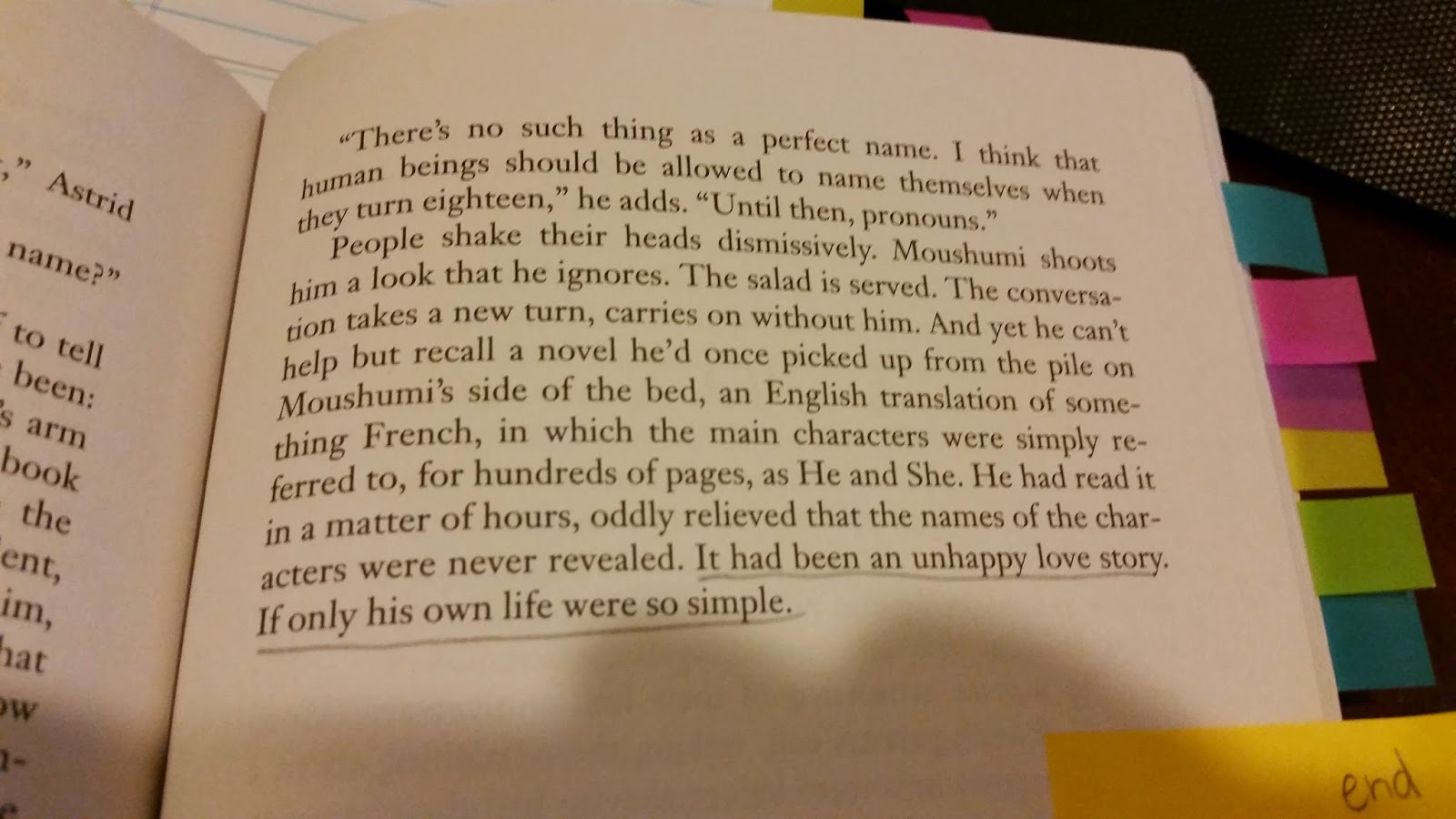Mise-en-scene Analysis:
A good scene in a film is like good food-- it's made of parts that have to be meticulously tended to-- or it will taste disgusting. Mise-en-Scene, French for what one puts into the scene or frame, is therefore, extremely important. There are 5 key elements of mis-en-scene, all present in my scene from The Namesake film (minutes 95-98).
Settings and Props:
The settings and the props are very “every day”. During the party, there are plates of food and glasses of wine. It is evident that this party is very “high end” and slightly pretentious. This makes Gogol’s discomfort in the scene more relatable. When the scene shifts to the taxi, Moushumi holds her bag defensively towards her, and it shows the couple’s tension about Gogol’s name.
Costume, Hair, and Makeup:
The scene creates a contrast between Gogol and the rest of the party through costume design choices. Moushumi chooses to sport a revealing, silver-sparkled shirt with a plunging neck-line. The rest of the group dons equally flashy and ornate clothing, each person trying their best to stand out. On the other hand, Gogol opts for a simple, brown suit and a dark shirt with clean lines and elbow patches; his hair appears unkempt unlike the rest of the group's meticulously groomed tendrils. This subtle contrast of attire between Gogol and the rest of the party group seems to suggest that Gogol doesn't quite belong to this group, and that he doesn't care as much about material things as other people.
Facial Expressions and Body Language:
Even as the scene opens, it is clear that Gogol isn’t comfortable in the party scene. While everyone else is sprawled around chairs and lounging, Gogol stands next to his wife, slightly askew. However, he is initially relaxed and leans against the couch where Moushumi sits, clearly at ease. However, when Gogol’s wife reveals that his name wasn’t initially Nikhil, his body position changes drastically. He shifts uncomfortably with his hand over his arm and he stops leaning against the couch. His face contorts with discomfort as his eyes shift nervously from his wife to the rest of the party. It is clear that he doesn’t appreciate this outing. On the other hand, his wife and the rest of the party continue to comfortably rest in very lax positions. It is evident that the idea of a namesake is not as important to him.
Lighting and Color:
Similarly, the lighting helps create the ambiance in the two settings of the scene. In the party setting, the light is a strong key lighting from the large fluorescent lights and lamps of Astrid and Donald’s apartment. It somehow makes the mood lighter and less serious-- trivializing the idea of names. Nair makes sure to cast light in a highlighting technique constantly towards Gogol to display his apparent discomfort at their exploitation of names and identity into comical small-talk. Later, in the car-scene where Gogol and Moushumi bicker, the lighting is changed to a natural lighting-- the faces of the two actors illuminated by the traffic lights. The unnatural light is stripped away as well as their polite pretenses and Gogol’s anger towards his wife clearly displays how important his name is to him now. This is interesting because in past scenes, Gogol had been seen trivializing his name with his friends in high school also in natural lighting. This shows that, naturally, Gogol has evolved with time and now sees the value in a namesake.
Positioning of Characters and Objects within the Frame:
The camera angles Nair used to position the characters in the scene also helped to create the scene. It emphasized the newfound importance Gogol held for his name and for his father. The camera angle presents Gogol placed off to the side near Moushumi, slightly askew. The angle position makes Gogol appear as if he is not a part of the whimsical, light conversation of names-- a serious topic to Gogol. When Moushimi reveals that Gogol’s name wasn’t always Nikhil, the camera immediately presents a close up eye-level angle of him, making his background seem insignificant. It lingers on Gogol’s face as it contorts in awkward discomfort until he speaks and shifts back away once more. It is apparent that from Gogol’s facial expressions, participating in such a meaningless conversation about a name so important to him is very painful. This pain then erupts in the next setting. In the car, the camera angle once again shifts in on Gogol’s face as he angrily yells at Moushumi for revealing details of his life that were so intimate to him. The camera is even closer than it was in the past scene. It is clear that even as this small lapse of time has passed, Gogol has acknowledged even more the importance of the name his father had given him through his bursts of emotion, clearly displayed by the camera.



No comments:
Post a Comment